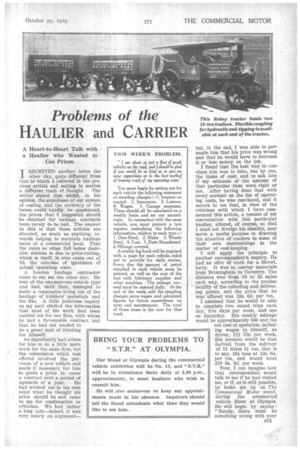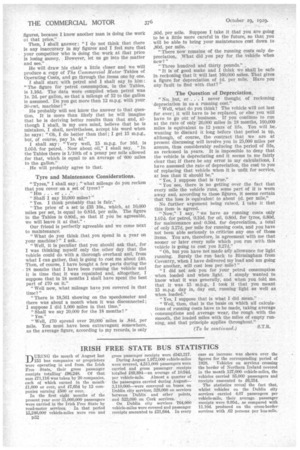Problems of the
Page 117

Page 118

If you've noticed an error in this article please click here to report it so we can fix it.
HAULIER and CARRIER A Heart-to-Heart Talk with a Haulierwho Wanted to Cut Prices.
T RECEIVED another letter the 1 other day, quite different from that to which I referred in the previous article and setting in motion a different train of thought. The writer stated that whilst, in his opinion, the soundness of our system of costing, and the accuracy of the items, -could -hardly be questioned, the prices that I suggested should be obtained for haulage contracts were rarely to be had. The answer to this is that these articles are directed, as much as anything, towards helping to maintain haulage rates at a commercial level. That the rates so often fall below desirable minima is due to price-cutting. which is itself, in nine cases out of 10, the outcome of ignorance of actual operating costs.
A London haulagecontractor came to see me the other day. He was of the one-man-one-vehicle Ow and had, until then, managed to make a reasonable living out of the haulage of builders' materials and the like. A little judicious inquiry on my part elicited the information that most of his work had been carried out for one firm, with whom he had a favourable contract, and that he had not needed to do a great deal of thinking for himself.
An opportunity had arisen for him to do a little more work for the same firm, but the commission which was offered involved the purchase of a new vehicle and made it necessary for him. to quote a price to cover a contract over a. period of upwards of a year. He had worked out in his own mind what he thought his price should be and came to me for confirmation or criticism. We had rather a long talk—indeed, it was' very nearly an argument but, in the end, I was able to persuade him that his price was wrong and that he -would have to increase it or lose money on the job. I found that the best way to convince him was to take, one by one, the Items of cost, and to ask him if my estimate of the amount of that particular item were right or not. After having done that with every account on the list of operating costs, he was convinced, and it occurs to me that, in view of the criticism with which I have commenced this article, a resumd of my conversation with thiS particular haulier, altered, of course, so that I shall not divulge his identity, may serve a useful purpose in drawing the attention of readers to some of their own shortcomings in the matter of cost-keeping.
I' will apply the principle to another correspondent's inquiry. He had an offer of work for a •30-cwt. lorry. It Was to convey materials, from Birmingham to Coventry. The distance was from -18 to" 25. miles each way, according to the precise locality of the collecting and deliVer
,ing points, and the price that he was offered Was 12s. .0d. per ton.
1 assumed that, he would be able to complete two round trips each day, five' days per week, and one en Saturday. His weekly mileage would be approximately 500 and the net cost of operation, including wages to himself, as driver, £11 15s. per week. His revenue would he that derived from the delivery of 11 times II ton, that is to say, 16itons at 12s. 6d. per ton, and would total £10 65. 3d. per week.
Now, I can imagine how that correspondent would talk to me if he had visited me, or if, as is still possible, he looks me up on The 'Commercial Motor stand, during the commercial vehicle Show at Olympia He will begin by saying: "Surely, there must be something wrong with your
figures, because I know another man is doing the work at that price."
Then, I shall answer: "I do not think that there is any inaccuracy in ray figures and I feel sure that your competitor who is doing the work at that price Is losing money. However, let us go into the matter and see."
He will draw his chair a little closer and we will produce a copy of The Commercial Motor Tables of Operating Costs, and go through the items one by one.
I shall start with petrol and I shall say to him: "The figure for petrol consumption, in the Tables, is 1.16d. The data were compiled when petrol was is. 2d. per gallon, so that a mileage of 12 to the gallon is assumed. Do you get more than 12 m.p.g. with your 30-cwt. machine?"
He probably will not know the answer to that question. It is more than likely that he will imagine that he is deriving better results than that and, although I shall, in my own mind, believe that he is mistaken, I shall, nefertheless, accept his word when he says: "Oh, I do better than that; I get 15 m.p.g., but, of course, pay is. 4d."
I shall say: "Very well, 15 m.p.g. for 16d. is 1.07th for petrol. Now about oil," I shall say. "In the Tables there is 1/10th of a penny per mile allowed for that, which is equal to an average of 600 miles to the gallon."
He will probably agree to that.
Tyre and Maintenance Considerations.
"Tyres," I shall say; " what mileage do you reckon that you cover on a set of tyres?"
" Hm . . er . . ."
"Shall I say 10,000 miles?"
"Yes. I think probably that is fair."
"The price of a set is 133 16s., which, at 10,000 miles per set, is equal to 0.81d. per mile. The figure in the Tables is 0.801, so that if you be agreeable, we will leave it at that."
Our friend is perfectly agreeable and we come next to maintenance.
" What do you think that you spend in a year on your machine?" I ask.
"Well, it is peculiar that you should ask that, for I was thinking myself only the other day that the vehicle could do with a thorough overhaul and, from what I can gather, that is going to cost me about £40. Then, of course, I have bought a few parts during the 18 months that I have been running the vehicle and it is time that it was repainted and, altogether, I suppose that in 18 months I shall have spent the best part of £70 on it."
"Well now, what mileage have you covered in that time?"
"There, is 18,561 showing on the speedometer and there was about a month when it was disconnected; I suppose I did 1,000 miles in that time."
" Shall we say 20,000 for tile 18 months?"
"Yes."
"Well, £70 spread over 20,000 miles is .84th per mile. You must have been extravagant somewhere, as the average figure, according to my records, is only
.80d. per mile. Suppose I take it that you are going to be a little more careful in the future, so that you will be able to bring your maintenance cost down to ,80d. per mile.
"There now remains of the running costs only depreciation. What did you pay for the vehicle when new?"
"Three hundred and thirty pounds.".
"It is'of good make and I think we shall be safe in reckoning that it will last 160,000 miles. That gives a figure for depreciation of -id. per mile. Have you any fault to find with that?"
The Question of Depreciation.
"No; but er . . . I never thought of reckoning depreciation in as a running cost."
Well, what do you think? The vehicle will not last for ever ; it will have to be replaced, or else you will have to go out of business. If you continue to run at the rate of only 20,000 miles in 18 months, 160,000 miles is equivalent to 12 years of life. You will be. wanting to discard it long before that period is up, although, of course, the contract that we are at present discussing will involve you in 25,000 miles per annum, thus considerably reducing the period of life, as reckoned in years. It is impossible to deny that the vehicle is depreciating and it seems to me fairly clear that if there be any error in my calculations, I have assessed the rata of depreciation, the cost to you of replacing that vehicle when it is unfit for service, at loss than it should be."
"Yes, I suppose that is true."
"You see, there is no getting over the fact that every mile the vehicle runs, some part of it is worn away and, according to these figures, it seems certain that the loss is equivalent to about 4d. per mile."
No further argument being raised, I take it that this item is agreed.
"Now," I say, "we have as running costs only 1.07d. for petrol, 0.10d. for oil, 0.80d. for tyres, 0.80d. for maintenance and 0.50th for depreciation, a total of only 3.27d. per mile for running costs, and you have not been able seriously to criticize any one of those items. You are, therefore, in agreement with me that sooner or later every mile which you run with this vehicle is going to cost you 3.27d."
"Oh, but you have not made arty allowance for light running. Surely the run back to Birmingham from Coventry, when I have delivered my load and am going for another, will cost less per. mile?"
"I did not ask you for your petrol consumption when loaded and when light. I simply wanted to know what it was generally, and when you told me, that it was 15 m.p.g., I took it that you meant 15 m.p.g, day in, day out, running light as well as when loaded."
"Yes, I suppose that is what I did mean."
" Well, then, that is the basis on which all calculations of running costs have to be made, taking average consumptions and .average wear, the rough with the smooth, the loaded miles with the miles of empty running, and that principle applies throughout."




























































































































































































